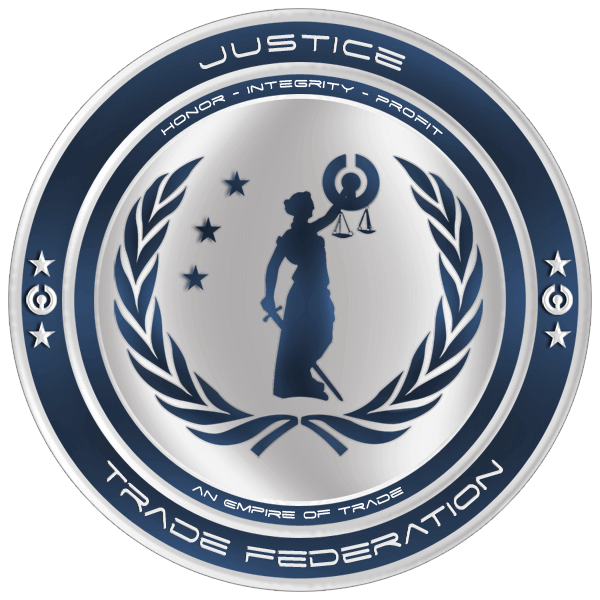Section 1 – Preliminary
Clause 1.1 – Purpose
The Government of the Trade Federation was founded on the principles of honor, integrity and profit. In accordance with the first and second of these principles, and in relation to the third, the following Code defines violations deemed to be against the interest of the Trade Federation Ministry of Defense, and the respective punishments for the commission of those violations.
Clause 1.2 – Applicability
This Code has full force and effect upon all service members of the Armed Forces of the Trade Federation, serving under the Ministry of Defense.
Clause 1.3 – Classes of Offenses
This Code recognizes the following violations:
Clause 1.4 – Judicial Procedures
All service members accused of a violation of this Code, by an authorized agent of the Ministry of Defense, are to be considered guilty of the act until such a time as the accused has proven their innocence before a Ministry Tribunal consisting of the Minister of Defense, or appointed representative of the Minister, the commanding officer of the accused service member, and the Chief Justice, or appointed representative of the Chief Justice.
Clause 1.5 – Incorporation
This Code also recognizes and incorporates the offenses listed in the Trade Federation Penal Code as follows: Capital Offenses as 1st Degree Violations, Felony Offenses as 2nd Degree Violations, and Misdemeanor Offenses as 3rd Degree Violations.
Section 2 – Punishments
Clause 2.1 – Purpose
Section 2 is an effort to standardize the punishment of all violations committed by the service members of the Armed Forces of the Trade Federation, under the Ministry of Defense.
Clause 2.2 – Levels of Punishments
This Code recognizes the following punishments:
Clause 2.3 – Classes of Offenses and Punishments
This Code reserves punishments as to the violations as described below:
CONDUCT VIOLATIONS
Section 10 – Conduct
Clause 10.1 – Conduct Unbecoming a Service Member and/or Officer
Conduct Unbecoming is defined as any act that:
Conduct Unbecoming is a 3rd Degree violation.
Section 11 – Improper Solicitation for Advancement
Clause 11.1 – Improper Solicitation
Improper Solicitation is defined as any act that:
Improper Solicitation is a 3rd Degree violation.
Section 12 – Improper Representation for Enlistment, Appointment or Dismissal
Clause 12.1 – Improper Representation
Improper Representation is defined as any act that:
Improper Representation is a 3rd Degree violation.
Section 13 – Contempt
Clause 13.1 – Contempt towards Citizens and/or Service Members
Contempt is defined as any act that:
Contempt is a 3rd Degree violation.
Section 14 – Unauthorized Use and/or Possession of Contraband and/or Restricted Technology While on Duty
Clause 14.1 – Contraband and Restricted Technology
Electronic Lock Breakers, Tracking Devices and Stuncuffs.
Clause 14.2 – Wrongful Use and/or Possession
Wrongful Use and/or Possession is defined as an act that:
Wrongful Use and/or Possession is a 2nd Degree violation.
Section 20 – Willful Disobedience
Clause 20.1 – Willful Disobedience
Willful Disobedience is defined as an act that:
Willful Disobedience is a 2nd Degree violation.
Section 21 – Insubordination
Clause 21.1 – Insubordination
Insubordination is defined as an act that:
Insubordination is a 2nd Degree violation.
Section 22 – Absence without Leave (A.W.O.L)
Clause 22.1 – A.W.O.L
A.W.O.L. is defined as an act that:
A.W.O.L. is a 3rd Degree violation.
Section 23 – Desertion
Clause 23.1 – Desertion
Desertion is defined as an act that:
Desertion is a 1st Degree violation.
Section 30 – Maltreatment of Service Members under a Command
Clause 30.1 – Maltreatment
Maltreatment is defined as an act that:
Maltreatment is a 2nd Degree violation.
Section 31 – Fitness for Command
Clause 31.1 – Fitness for Command
Any service member designated or appointed to a position of leadership within the Armed Forces of the Trade Federation who demonstrates unsound command and/or judgment in the view of the Minister of Defense, Deputy Minister of Defense, Fleet Commander and/or FSS-General may be deemed unfit for command, and relieved of their duties.
